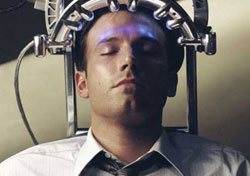
 Paycheck most certainly was just that for star Ben Affleck, because he invests very little in the film, other than portraying an unlikable chucklehead, which his protagonist is not supposed to be. Like Minority Report (but with lower star wattage and much less behind-the-camera skill), Paycheck is based on a Philip K. Dick short story. Affleck plays some kind of freelance techno-whiz who consults on jobs so top-secret that after his gig is over, his memory of the experience is erased. As the story begins, he accepts a two-year assignment — one far longer than ever before — that will result in an eight-figure payday, meaning he won’t have to work ever again.
Paycheck most certainly was just that for star Ben Affleck, because he invests very little in the film, other than portraying an unlikable chucklehead, which his protagonist is not supposed to be. Like Minority Report (but with lower star wattage and much less behind-the-camera skill), Paycheck is based on a Philip K. Dick short story. Affleck plays some kind of freelance techno-whiz who consults on jobs so top-secret that after his gig is over, his memory of the experience is erased. As the story begins, he accepts a two-year assignment — one far longer than ever before — that will result in an eight-figure payday, meaning he won’t have to work ever again.
But when he’s done and his brain is wiped clean of the previous 24 months, he is shocked to find that he has forfeited his money in exchange for an envelope full of 20 items worthy of a junk drawer: a paper clip, a pass key, Affleck’s career. He’s also pursued by the police, for a murder he’s not sure he did or didn’t commit, and as he flees, he learns that each item in the envelope helps him evade capture. Perhaps he was working on a machine that could foresee … the future?!?
 It’s not a terrible idea for a film, but director John Woo and company have steered it down that road. Woo’s Asian sensibilities simply do not translate well to American film; his direction is needlessly showy, making for choppy editing, awkward pacing and poor performances. Plus, when he manages — even in a sci-fi thriller — to throw a shot of his beloved white doves, I had to groan.
It’s not a terrible idea for a film, but director John Woo and company have steered it down that road. Woo’s Asian sensibilities simply do not translate well to American film; his direction is needlessly showy, making for choppy editing, awkward pacing and poor performances. Plus, when he manages — even in a sci-fi thriller — to throw a shot of his beloved white doves, I had to groan.
Affleck has shown signs of being able to act before, but here he’s simply coasting; the man can’t even laugh credibly. As a biologist and requisite love interest, Uma Thurman is completely vacant, giggling and trying to act like she’s Kate Hudson or something. She’s not and it doesn’t matter, anyway, because she and Affleck have zero chemistry. Oh, and I’m not certain, but I think Paul Giamatti is supposed to be playing a monkey. —Rod Lott
